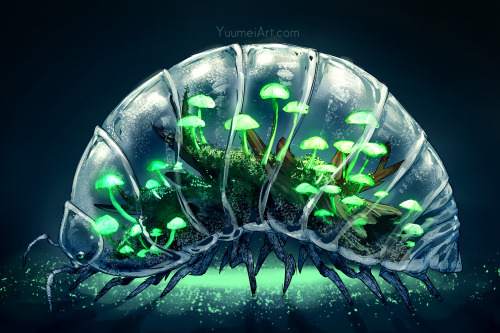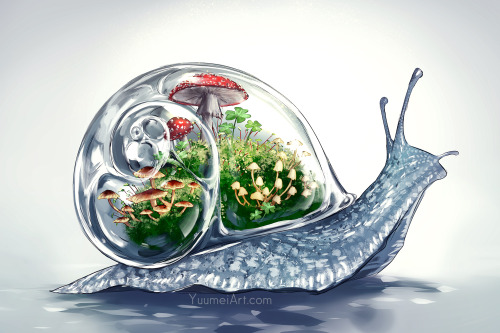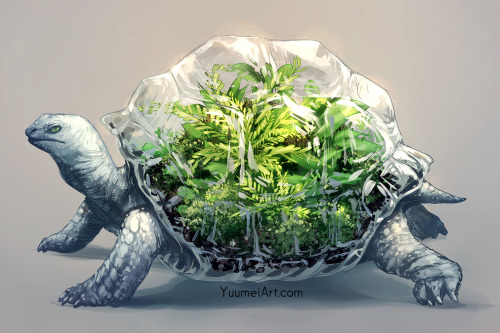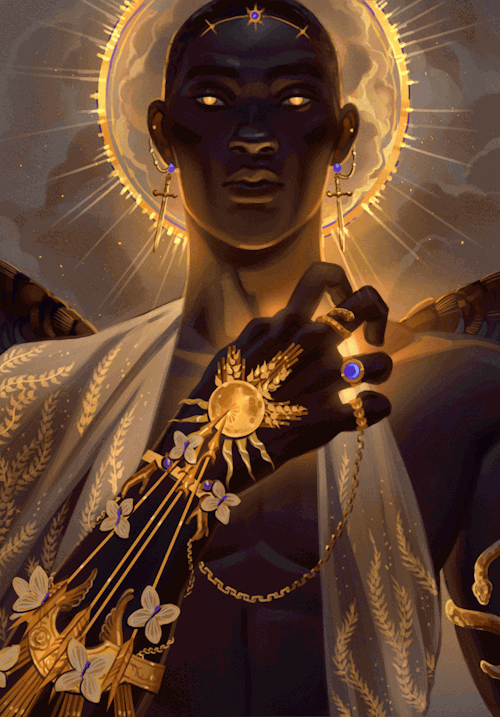One Of The Most Common Ways You Preserve Pork Without Refrigeration Is Keeping It In Really Salty Water.
One of the most common ways you preserve pork without refrigeration is keeping it in really salty water. This makes the pork borderline inedible because it’s so salty. What you don’t see in medieval fantasy is people soaking their meat in water for a bit before they cook it.
That’s also a reason to boil your meat though. Like yeah meat tastes better if you sear it first but sometimes you’ve gotta get that salt out.
More Posts from Reaperswriting and Others



eastern jack-o-lantern mushrooms (Omphalotus illudens) completely encircling the base of this giant northern red oak tree


The Skeleton flower, whose petals turn from white to translucent when it rains.
The Skeleton flower (Diphylleia grayi) is a white woodland blossom flower with large, umbrella-like leaves that grows in moist, colder climates and wooded mountainsides and they are found in Japan, China and the Appalachian Mountains in the US. Indeed, the white petals turn glass-like when they get wet due to their loose cell struture and not because the pigments are being washed out. When it rains, water fills up the cells in the petals, hence turning clear. However, when the petals dry out, they turn back to their original white color. There's no conclusive research as to whether this characteristic is beneficial or a bad thing for these beautiful flowers.
📷 Unknown (credit to owner)






(via)




Worlds Within: Pill Bug Terrarium
Bioluminescent mushrooms are just magical~ I hope to see these in real life one day :D In the meantime, I can dream and paint them instead.

Malyarova Olga Couture
reposting this on here because I enjoy this account and because this is a really useful visual depiction of how to mend using thread.
I cannot describe how much I love plant horror 💕
I blame my elementary school science teacher who did a week on invasive species and introduced us to those pics of kudzu vines that are in the shape of animals and monsters ans how rapidly they spread
Like, I just want to be devoured by the earth while my blood is still warm and there's still breath in my lungs. I think it would be fittingly painful and very nice.
I just want to:








Hello, everyone!
Now your group can explore a mine that is rich in a mineral from another dimension! This mine has just begun operations recently, and a strange crystal with powerful properties is being mined to create powerful artifacts.
But soon after, the miners start to mysteriously vanish and creatures from another world start pouring out of the rift! Your players can help the miners clean out the mine and have access to a strange world underground.
The creature tokens for this map are a Deep Flesh Devourer, a Deep Spider Aberration and a Dwarf Grenadier. Emerald tier gets the Deep Spider Aberration while Diamond tier gets all three. In addition, Sapphire tier gets extra creature token variants.
You can see a preview of all of this week’s Patreon content here.
Thank you very much for taking a look and be sure to check out my Patreon where you can pledge for gridless version, alternate map versions as well as the tokens pertaining to this map.
Fantasy Guide to Building A Culture

Culture is defined by a collection of morals, ethics, traditions, customs and behaviours shared by a group of people.
Hierarchy and Social Structures

Within every culture, there is a hierarchy. Hierarchies are an important part of any culture, usually do ingrained that one within the culture wouldn't even question it. Hierarchy can be established either by age, gender or wealth and could even determine roles within their society. Sometimes hierarchy can may be oppressive and rigid whilst other times, ranks can intermingle without trouble. You should consider how these different ranks interact with one another and whether there are any special gestures or acts of deference one must pay to those higher than them. For example, the Khasi people of Meghalaya (Northern India), are strictly matrillineal. Women run the households, inheritance runs through the female line, and the men of the culture typically defer to their mothers and wives. Here are a few questions to consider:
How is a leader determined within the culture as a whole and the family unit?
Is the culture matriarchal? Patriarchal? Or does gender even matter?
How would one recognise the different ranks?
How would one act around somebody higher ranking? How would somebody he expected to act around somebody lower ranking?
Can one move socially? If not, why? If so, how?
Traditions and Customs

Traditions are a staple in any culture. These can be gestures or living life a certain way or to the way a certain person should look. Traditions are a personal detail to culture, they are what make it important. Tradition can dictate how one should keep their home, run their family, take care of their appearance, act in public and even determine relationship. Tradition can also be a double edged sword. Traditions can also be restrictive and allow a culture to push away a former member if they do not adhere to them, eg Traditional expectations of chastity led to thousands of Irish women being imprisoned at the Magdelene Laundries. Customs could be anything from how one treats another, to how they greet someone.
How important is tradition?
What are some rituals your culture undertakes?
What are some traditional values in your world? Does it effect daily life?
Are there any traditions that determine one's status?
Values and Opinions

Values and Opinions are the bread and butter of any culture. This is the way your culture sees the world and how they approach different life hurdles. These may differ with other cultures and be considered odd to outsiders, what one culture may value another may not and what opinion another holds, one may not. There will be historical and traditional reasons to why these values and opinions are held. Cultures usually have a paragon to which they hold their members to, a list of characteristics that they expect one to if not adhere to then aspire to. The Yoruba people value honesty, hard work, courage and integrity. Here are some questions to consider?
How important are these ethics and core values? Could somebody be ostracised for not living up to them?
What are some morals that clash with other cultures?
What does your culture precieved to be right? Or wrong?
What are some opinions that are considered to be taboo in your culture? Why?
Dress Code

For many cultures, the way somebody dresses can be important. History and ethics can effect how one is meant to be dressed such as an expectation of chastity, can impose strict modesty. While other cultures, put more importance on details, the different sorts of clothes worn and when or what colour one might wear. The Palestinian people (من النهر إلى البحر ، قد يكونون أحرارا) denoted different family ties, marriage status and wealth by the embroidery and detailing on their thoub.
Are there traditional clothes for your world? Are they something somebody wears on a daily basis or just on occasion?
Are there any rules around what people can wear?
What would be considered formal dress? Casual dress?
What would happen if somebody wore the wrong clothes to an event?
Language

Language can also be ingrained as part of a Culture. It can be a specific way one speaks or a an entirely different language. For example, in the Southern States of America, one can engage in a sort of double talk, saying something that sounds sweet whilst delivering something pointed. Bless their heart. I have a post on creating your own language here.
Arts, Music and Craft

Many cultures are known for different styles of dance, their artwork and crafts. Art is a great part of culture, a way for people to express themselves and their culture in art form. Dance can be an integral part of culture, such as céilí dance in Ireland or the Polka in the Czech Republic. Handicrafts could also be important in culture, such as knitting in Scottish culture and Hebron glass in Palestine. Music is also close to culture, from traditional kinds of singing such as the White Voice in Ukraine and the playing of certain instruments such as the mvet.
Food and Diet

The way a culture prepares or intakes or treats certain foods are important to a culture. In some cultures, there is a diet yo adhere to, certain foods are completely banned. With Jewish culture, pork is prohibited along with fish such as sturgeon, along with shellfish and certain fowl. Meat must also be prepared in a certain way and animal byproducts such as dairy, must never be created or even eaten around this meat. This is known as kosher. The way one consumes food is also important to culture. In some cultures, only certain people may eat together. Some cultures place important on how food is eaten. In Nigerian culture, the oldest guests are served first usually the men before the women. In Japanese culture, one must say 'itadakimasu' (I recieve) before eating. Culture may also include fasting, periods of time one doesn't intake food for a specific reason.
What are some traditional dishes in your world?
What would be a basic diet for the common man?
What's considered a delicacy?
Is there a societal difference in diet? What are the factors that effect diet between classes?
Is there any influence from other cuisines? If not, why not? If so, to what extent?
What would a typical breakfast contain?
What meals are served during the day?
What's considered a comfort food or drink?
Are there any restrictions on who can eat what or when?
Are there any banned foods?
What stance does your world take on alcohol? Is it legal? Can anybody consume it?
Are there any dining customs? Are traditions?
Is there a difference in formal meals or casual meals? If so, what's involved?
Are there any gestures or actions unacceptable at the dinner table?
How are guests treated at meals? If they are given deference, how so?
-
 frozeneclipsewolf reblogged this · 1 week ago
frozeneclipsewolf reblogged this · 1 week ago -
 frozeneclipsewolf liked this · 1 week ago
frozeneclipsewolf liked this · 1 week ago -
 marshmallowtears reblogged this · 2 weeks ago
marshmallowtears reblogged this · 2 weeks ago -
 didntaskforfrozenyoghurt liked this · 2 weeks ago
didntaskforfrozenyoghurt liked this · 2 weeks ago -
 roucarnagelepusillanime liked this · 2 weeks ago
roucarnagelepusillanime liked this · 2 weeks ago -
 ellisnyeland reblogged this · 2 weeks ago
ellisnyeland reblogged this · 2 weeks ago -
 le-catman reblogged this · 2 weeks ago
le-catman reblogged this · 2 weeks ago -
 hardly-questionable liked this · 2 weeks ago
hardly-questionable liked this · 2 weeks ago -
 shimmeringecho liked this · 2 weeks ago
shimmeringecho liked this · 2 weeks ago -
 duerme07 reblogged this · 2 weeks ago
duerme07 reblogged this · 2 weeks ago -
 squishyskeleton liked this · 2 weeks ago
squishyskeleton liked this · 2 weeks ago -
 duckaday liked this · 2 weeks ago
duckaday liked this · 2 weeks ago -
 kisekagas liked this · 2 weeks ago
kisekagas liked this · 2 weeks ago -
 italeteller reblogged this · 2 weeks ago
italeteller reblogged this · 2 weeks ago -
 hijojo121 reblogged this · 2 weeks ago
hijojo121 reblogged this · 2 weeks ago -
 tezmotismo liked this · 2 weeks ago
tezmotismo liked this · 2 weeks ago -
 molero-apologist reblogged this · 2 weeks ago
molero-apologist reblogged this · 2 weeks ago -
 molero-babygirl liked this · 2 weeks ago
molero-babygirl liked this · 2 weeks ago -
 pacack reblogged this · 2 weeks ago
pacack reblogged this · 2 weeks ago -
 pacack liked this · 2 weeks ago
pacack liked this · 2 weeks ago -
 nuthead liked this · 2 weeks ago
nuthead liked this · 2 weeks ago -
 krysta-walker reblogged this · 2 weeks ago
krysta-walker reblogged this · 2 weeks ago -
 krysta-walker liked this · 2 weeks ago
krysta-walker liked this · 2 weeks ago -
 so-fucking-gay26 reblogged this · 2 weeks ago
so-fucking-gay26 reblogged this · 2 weeks ago -
 circusbutch liked this · 2 weeks ago
circusbutch liked this · 2 weeks ago -
 unfuckitall liked this · 2 weeks ago
unfuckitall liked this · 2 weeks ago -
 chibisquirt reblogged this · 2 weeks ago
chibisquirt reblogged this · 2 weeks ago -
 letheancloud reblogged this · 2 weeks ago
letheancloud reblogged this · 2 weeks ago -
 angelaeon liked this · 2 weeks ago
angelaeon liked this · 2 weeks ago -
 akesi-kili-jume reblogged this · 2 weeks ago
akesi-kili-jume reblogged this · 2 weeks ago -
 kijetesantakalu-lanpan liked this · 2 weeks ago
kijetesantakalu-lanpan liked this · 2 weeks ago -
 iamahideousness reblogged this · 2 weeks ago
iamahideousness reblogged this · 2 weeks ago -
 iamahideousness liked this · 2 weeks ago
iamahideousness liked this · 2 weeks ago -
 sidereal-sapphic reblogged this · 2 weeks ago
sidereal-sapphic reblogged this · 2 weeks ago -
 sidereal-sapphic liked this · 2 weeks ago
sidereal-sapphic liked this · 2 weeks ago -
 frankensteins-mt-dew liked this · 2 weeks ago
frankensteins-mt-dew liked this · 2 weeks ago -
 zephsomething reblogged this · 2 weeks ago
zephsomething reblogged this · 2 weeks ago -
 torc87 reblogged this · 2 weeks ago
torc87 reblogged this · 2 weeks ago -
 torc87 liked this · 2 weeks ago
torc87 liked this · 2 weeks ago -
 unidentifiedfuckingthing liked this · 2 weeks ago
unidentifiedfuckingthing liked this · 2 weeks ago -
 annoyinglyfanon reblogged this · 2 weeks ago
annoyinglyfanon reblogged this · 2 weeks ago -
 notaceofstars liked this · 2 weeks ago
notaceofstars liked this · 2 weeks ago -
 dani-ari liked this · 2 weeks ago
dani-ari liked this · 2 weeks ago -
 atereal reblogged this · 2 weeks ago
atereal reblogged this · 2 weeks ago -
 atereal liked this · 2 weeks ago
atereal liked this · 2 weeks ago -
 javiiaevelyn reblogged this · 2 weeks ago
javiiaevelyn reblogged this · 2 weeks ago -
 dykemanticore liked this · 2 weeks ago
dykemanticore liked this · 2 weeks ago -
 deci-doodles liked this · 2 weeks ago
deci-doodles liked this · 2 weeks ago -
 capriciouslyvexed liked this · 2 weeks ago
capriciouslyvexed liked this · 2 weeks ago

23, Australian, this is where I'm dropping my writing inspo and pieces.
90 posts
